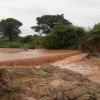Description
Sand dams, a popular water harvesting structure employed by rural communities, capture and store water for use during the dry season in arid and semi-arid regions. This dataset was produced during a year-long, in-depth field study of three sand dams in Tanzania. The study investigated a sand dam’s impact on vegetation, streambank erosion, and the local water table. Vegetation surveys were performed every other month, and erosion was recorded semi-monthly. Water table monitoring wells were installed at each sand dam, and measurements were taken twice a day. The functioning sand dams, Chididimo and Soweto, store a significant amount of water, but most is lost to evapotranspiration shortly after the dry season begins. The functioning sand dams have a positive impact on local vegetation and minimal impact on erosion. Kimokouwa sand dam is essentially non-functioning. Erosion and water table measurements were taken and recorded by trained community volunteers.
Cite this work
Researchers should cite this work as follows:
- Eisma, J. A.; Merwade, V. M. (2019). Environmental Response Data for Tanzanian Sand Dams. Purdue University Research Repository. doi:10.4231/GYSC-1X41
Tags
Notes
We would like to thank the Kimokouwa, Soweto, and Chididimo community water groups, without whom this research would not have been possible. This work was supported by the NSF grant DGE-1333468 (Graduate Research Fellowships Program) and the USAID grant A1134 to Purdue University. Further support for this work came from a Fulbright U.S. Student Award to Jessica Eisma.
